#tuberculosis is not the only health problem
Text
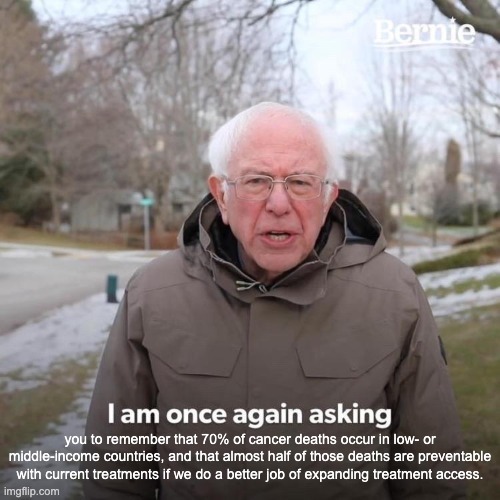
(I learned this from Hank.)
#global health#tuberculosis is not the only health problem#the real health problem is inadequate access to treatment#and fragile healthcare systems#the world's leading cause of death is impoverishment#hank green
4K notes
·
View notes
Text



So I have a prospero death theory
From what we see here the hands are medically “tearing” him to pieces this leads into my theory
The red death was inspired by tuberculosis wich caused “death like” spells so many people were buried alive so what if he donated his body to science
(Of course family often makes the decisions after death but my thinking is that it would have been a decision he made before death)
However if he had tuberculosis and went into a spell where everyone would believe him to be dead and his body was donated then maybe we woke up during a operation it’s very common practice even today for medical students to practice dissection on body’s donated to science
It’s even possible that he had some form of chronic illness that was unknown at the time and because of that he went through numerous procedures and treatments that were really painful
MINOR FAST PAST SPOILERS 88-91
While there’s nothing confirmed yet the reason I believe he would donate his body to science is because he was a doctor himself we see in these episodes he has medical knowledge to help will with his throat and immediately react to helping montysor (idk how to spell his name) yes he has the concern of losing teammates but doctors are also under a oath to protect and do no harm (with includes watching a man bleed out on the floor)
This is why this is his fear this is how he died or alternatively he was a medical student and this happened during a practice dissection and it became a deeply rooted fear of his
(Also look at the hands doing the operation they aren’t wearing gloves wich where invented in 1899 so we now have a time zone for when he was alive)
I personally believe that growing up he had a chronic illness that he had numerous medical procedures and treatments that were painful and didn’t work so he grew up to be a doctor to figure out what is going on with him and to make the medical industry better he arranged that when he died to donate his remains to science only to be Fausly pronounced dead and then died on the operating table of some med schools biology lab
(Medical isn’t already the best especially extremely before back then and medical today still often ignores aromatic and asexual has actual orientations and often try to medicalize it as a “problem” or list it as a symptom wich can really screw with the health of the patient so it’s very possible he also could have died from a very preventable illness of the time but died because of the ignorance of the time that sadly is still around today )
Complete side note I believe he was a genuinely good person when alive we see he tries hard to be a good person we still don’t know if he was in on the “wall up Duke plan” but I don’t think he was
#nevermore prospero#prospero nevermore#nevermore webtoon#nevermore webcomic#webtoon#nevermore theory#theory
82 notes
·
View notes
Text
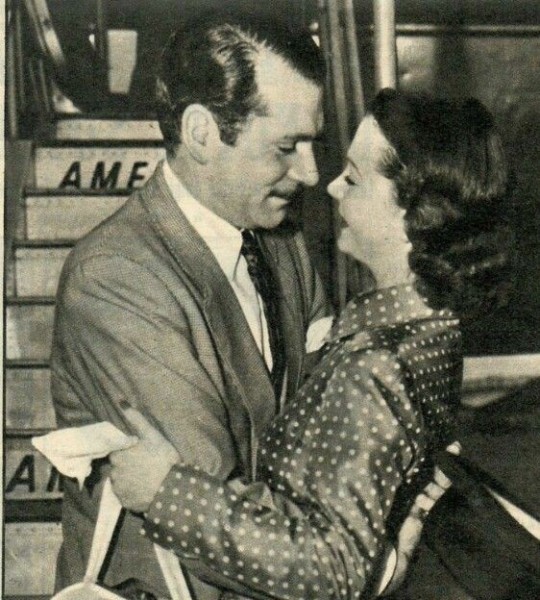
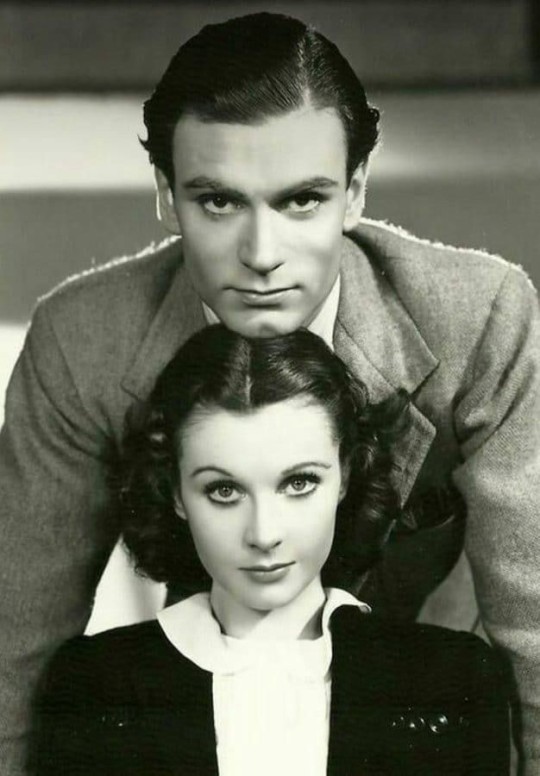
Vivien Leigh and Laurence Olivier met for the first time in 1939 after a theatrical performance of The Mask of Virtue.
From the first meeting, there was an attraction between the two
After their conversation, Vivien said to one of her friends “This is the man I will marry,” ignoring the fact that she is married and he is also married
After one of Olivier's performances, Vivien visited him in his room, and after chatting a little with a rising actress before she left, she kissed Olivier on the neck shyly and left.
Vivien was attracted to Laurence because of his charm and charisma, according to a biography written about Vivien Leigh
Lawrence was attracted to her in a way he had never been to any other woman
Olivier said in Lord Larry:
"I couldn't help myself with Vivian, no one could."
"I hated myself for cheating on Jill, but then I had cheated before, but this was something different. This wasn't just lust. This was the love I didn't really ask for but was drawn to."
A year later, a movie brought them together
Fire Over England
They spent all their time together, but they succumbed to each other's attraction and their secret relationship began
After a period of time, their relationship was secret, and when Vivien played Ophelia on stage in Hamlet, she suffered a brutal bipolar attack. When Laurence Olivier entered the dressing room, Lee suddenly started shouting at him. This incident shook Olivier, as he later described how it was like a switch had been flipped. Lee started yelling at him, then immediately stopped as if nothing had happened. Unfortunately, her illness will get worse.
During their separation in order to expand their professional life, the two exchanged scandalous and romantic letters, dating back to between 1938 and 1939.
After a dispute over my role as Scarlett in the movie Gone with Profit, I was surprised by the difficulty of the work and everyone’s fear of the failure of the assigned project. She wrote to Olivier explaining how she felt.
He responded to her
You have to be very smart to succeed in your photo career, which is essential for your self-esteem." "…I'm afraid you might become boring. Never for me…but for yourself and because of that for others. It seemed that Olivier's letters were what kept Lee going
After much struggle, the two finally married in 1940
Vivien contracted tuberculosis in 1944 while she was on a trip to South Africa and Olivier was afraid that his wife would die.
“Please, my angel, send me word of what the doctor said, + if I may ask him to send me a report.”
“You are the only person in the world who can make me so hideously selfish love someone else more than I love myself.”
In 1947, Lee's mental state became worse and Olivier's professional life became better.
In 1948, Lee and Olivier went on a six-month tour in Australia and New Zealand to perform and raise money for the theater. Lee's health condition was poor, and severe quarrels occurred between the two due to Lee's sharp fluctuations and Olivier's lack of knowledge of how to deal with her. The strongest quarrel was when Vivien refused to go on stage with Olivier. Because she could not find her shoe, Olivier could not bear her childish behavior and slapped her in the face in front of everyone. She responded to Lee by hitting him on the back hard. However, at the end, the two of them went up on stage with smiles on their faces, but Olivier learned that he lost her in Africa.
Their professional lives were putting a lot of pressure on their relationship and there were constant comparisons, and she was taking the issue seriously and with great fear
The two still wrote letters when apart, but even that romance was beginning to fade
Lee's mental state was devastating for the two
In 1958, I was introduced to Jacques Merivale, who was aware of all his psychological and physical problems. When Olivier found out about this, he asked Jacques to take care of Vivian, and he promised him that.
The instability in their romantic relationship worsened Lee's emotional and mental condition.
By 1960, Vivien was threatening suicide. “Vivien is several thousand miles away, trembling on the brink, even when she sits quietly in her drawing room,” Olivier once said. Olivier and Lee filed for divorce in May 1960. The divorce was finalized later that year and Olivier married again.
Although they were no longer together, Olivier and Vivien continued to write to each other every now and then.
“I want to thank you for understanding all of this for me,” Olivier wrote in a letter to Lee regarding their divorce, according to The Guardian. “You did a noble, brave, beautiful thing, and I'm so sorry, so sorry, because it must have been a hell of a lot for you.”
But she once said to newspaper, “I would rather have a short life with Olivier than a long life without him.”
Her husband, Jack Merivale, left her at home while he went to perform in a play in Eaton Square. When he returned around midnight, he found Lee asleep in bed. Half an hour later, he entered to find her body on the ground. Leigh apparently tried to walk to the bathroom and collapsed due to her lungs filling with fluid, according to Vivien Leigh: A Biography of Anne Edwards.
Merival alerted the Vivien family and then Olivier
He attended and participated in Vivian's funeral even though he was undergoing treatment for prostate cancer
Olivier Merival helped make funeral arrangements and stayed with Lee until her body was removed.
1967 On July 8, Vivien Leigh's death was announced, and all theaters in London's West End turned off their lights for one hour in her honour. A memorial service was held at St Martin-in-the-Fields and Lee's cremated ashes were spread on the lake at her summer home, Tickerage Mill in East Sussex, England.
In a final letter to Vivien just five weeks before her death, Olivier signed, “Sincere love my dear, your Larry.”
In 1989, on July 11, Olivier died of kidney failure
Even after his marriage to Plowright, Olivier held Lee dear in his heart for the rest of his life. It is said that shortly before his death, he found Olivier watching a film starring Lee, with tears in his eyes,
“This, this was love,” he said
#classic hollywood#old hollywood#classic cinema#1940s#classic films#classic movie stars#classic movies#1950s#vivien leigh#laurence olivier#Vivien Leigh and Laurence Olivier#vivien and Laurence#tragic love#sad ending#love#love you forever
20 notes
·
View notes
Note
What do you think of contemporary writers diagnosing Franz Kafka with specific mental illnesses? (Love this blog. I trust your takes on him!)
I always try to be careful when talking about Kafka's mental illnesses because officially we don't have a diagnosis. The only thing I can say is that Kafka was always physically weak and had number of problems (mostly digestive issues, headaches, lastly tuberculosis) so years of such "little sicknesses" did strain his nerves and mental health and made him a hypochondriac (he called himself that).
It seems that his hypochondria grew into full neurosis as the symptoms of neurosis can be recognized in his writings (diaries/letters). They have been analyzed by many doctors so im pretty sure its accurate.
Since he was prone to suicidal ideation (again, evidence from diaries/letters) it can be said that his neurosis caused him to develop depression (due to his poor health and all the stigma that came with it).
It could also be possible that he suffered from social anxiety but im not sure about this one (at least i don't think it could be diagnosed as serious mental illness in Kafka's case).
So shortly, it can be said that Kafka suffered from neurosis, depression and possible social anxiety. Hope this answers your question😄
P.S. any more serious diagnosis about Kafka's health seems to me a bit overstretched as usually it can't be diagnosed just from analyzing someone's writings.
#not even talking about emotional abuse by his father and how it affected his mental health/self image#asks
37 notes
·
View notes
Text
This overview of the history illustrates the pervasiveness of “belief perseverance,” the psychological tendency to maintain a belief despite clear and strong new evidence that should challenge it, especially in the context of institutional incentives that favor inertia and resistance to change. In an era of amazing scientific advances, with very rapid vaccine development following virus sequencing obtained in a few days, the very slow acceptance of critical new knowledge reminds us that the human aspects of science remain as pervasive as they were in past eras.
The persistence of the droplet paradigm may have been aided by several other reasons. First, even if the mechanism is incorrect, it still works reasonably well to reduce infection from airborne diseases, especially less contagious ones that mostly transmit in close proximity. Distance from an infectious person will always increase the dilution of exhaled air and reduce such transmission. Unfortunately, major systematic problems arise when a true empirical fact (distance reduces transmission) is used to reach the incorrect conclusion (the mechanism is spray-borne droplets), and then, the incorrect mechanism is used to deduce what other measures may be protective. For example, during the COVID-19 pandemic billions of dollars were spent putting up lateral plexiglass barriers in schools to block droplet projectiles (even though such barriers have actually been shown to increase SARS-CoV-2 transmission29) rather than opening the windows or wearing masks. Second, spray-borne droplets are relatively easy to protect against, just keep your distance and wash hands and you should be quite safe. It thus provides simple rules to communicate to healthcare workers and the general population. Third, it removes the intense fear that airborne transmission can cause, and that has been associated with it throughout history. The historical fear often appears to be rooted in the more phantasmagorical conception of airborne transmission: The infected air can reach a person anywhere, and there is little that one could do to protect oneself from it. Critically, the logic leading to the fear did not account for the importance of dilution, and the feasibility of using it to reduce transmission. The irrational fear caused by this lack of understanding is paralyzing and creates real-world problems for controlling disease transmission, as summarized, for example, in the above quotes from Cornet and Chapin: Either people just gave up, or extreme measures were needed such as treating tuberculosis patients like lepers. Fourth, given that strict airborne transmission prevention measures can be costly or unavailable at large scale in healthcare facilities (e.g., negative pressure rooms in hospitals), there was a reluctance of public health organizations to declare a widespread virus such as SARS-CoV-2 during the pandemic as airborne, out of fear of the budgetary, legal, and labor consequences. Governments also seemed content to promote measures that only require personal responsibility, such as handwashing, and were much more reluctant to explain airborne transmission clearly as it would require costly actions on their part, for example, to improve ventilation and filtration in public buildings. Finally, a desire to save face by some authorities may have also played a role. They had emphatically declared airborne transmission of SARS-CoV-2 to be “misinformation,” and it could be embarrassing to subsequently acknowledge the importance of airborne transmission, which may perhaps qualify as one of the largest errors in the history of public health. In the private words of a public health advisor to a national government, “an approach is needed that will allow [us] to save face.”
interesting paper about how/why authorities incorrectly identified COVID as a non-airborne disease, exacerbating the pandemic and spreading misinfo about protective measures
7 notes
·
View notes
Text

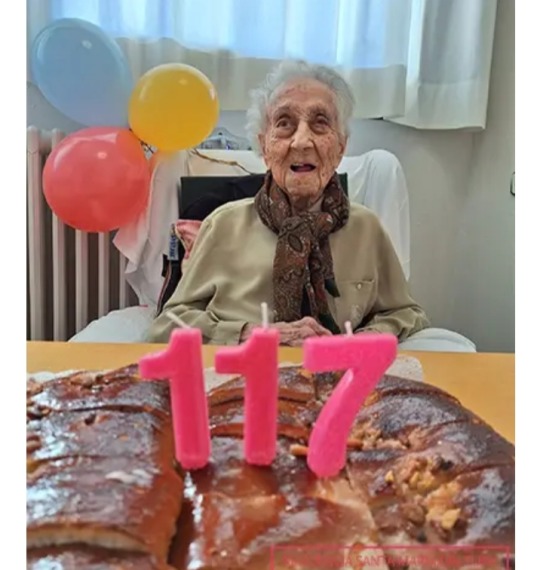
Today is the 117th birthday of the world’s oldest living person, Maria Branyas Morera.
Maria was born on 4 March 1907 in San Francisco, USA, but returned to Spain with her family when she was eight to settle in Catalonia.
She's lived in the region ever since and has resided in the same nursing home for the past 23 years.
She became the oldest person on Earth in January 2023, following the death of 118-year-old Lucile Randon (France).
"She is very grateful for all the congratulations received and the interest that so many people have shown in her state of health," said Eva Carrera Boix, the director of Maria's nursing home.
"She is happy to be able to celebrate this special day intimately with her family and colleagues and wishes everyone a happy Monday."
Beyond being hard of hearing and having mobility issues, Maria has no physical or mental health problems.
In fact, she's in such good condition that she has agreed to undergo scientific testing by researchers who hope to gain further insight into the secrets to long life.

Scientist Manel Esteller, who has conversed with Maria at length, told Spanish outlet ABC:
“She has a completely lucid head. She remembers with impressive clarity events from when she was only four years old, and she does not present any cardiovascular disease, common in elderly people.
It is clear that there is a genetic component because there are several members of her family who are over 90 years old.”
Samples of Maria’s saliva, blood and urine have been taken and will be compared with those of her 80-year-old daughter.
The researchers hope that assessing Maria’s genes will aid the development of drugs which could combat diseases associated with ageing.
Befitting her status as the world’s oldest person in the digital age, Maria is active on X (formerly known as Twitter) with assistance from her daughter.
Her bio states: “I'm old, very old, but not an idiot.”
In addition to “luck and good genetics,” Maria attributes her longevity to “order, tranquility, good connection with family and friends, contact with nature, emotional stability, no worries, no regrets, lots of positivity, and staying away from toxic people.”
Due to her poor hearing, Maria's family use a voice-to-text device to communicate with her.
She became permanently deaf in one ear when she was a child, after falling while playing with her brothers during the voyage from America to Spain in 1915.
This wasn’t the only misfortune the family suffered aboard the ship – Maria’s father sadly died due to pulmonary tuberculosis towards the end of the journey.
Maria lived through the Spanish Flu pandemic of 1918 as well as the Spanish Civil War (1936–1939), which she said she has “very bad memories” of.
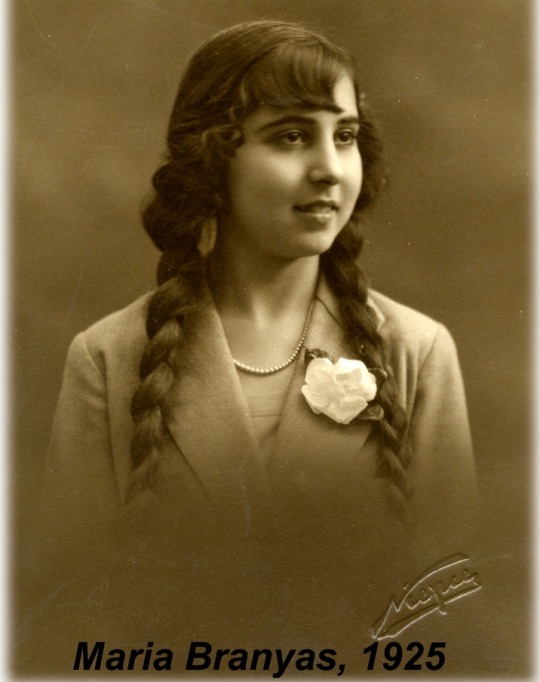
She got married in 1931 to a Catalan doctor named Joan Moret, with whom she had three children.
Her husband passed away in 1976; she has also outlived her only son, August, who died in a tractor accident at the age of 86.
Over a century after the 1918 pandemic, Maria also survived COVID-19.
She contracted the virus a few weeks after turning 113 in 2020 but made a full recovery within days, becoming the world’s oldest COVID-19 survivor.
The title was taken later in the year by Lucile Randon, who was three years older than Maria.
Despite admitting that she’s “getting closer and closer to death” in a post on X last month, Maria maintains a positive outlook on life and believes that there is always something new to learn every day, even at her grand old age.
She is now the 12th oldest verified person in history and should she reach her 118th birthday, she’ll climb up to 5th place.
The oldest person ever authenticated was Frenchwoman Jeanne Calment, who lived to the age of 122 years 164 days.
Source: Guinness World Records
youtube
Celebrating the World's Oldest Person: Maria Branyas Morera's 117th Milestone
5 March 2024
From surviving global pandemics to outliving generations, Maria’s journey is a testament to longevity and resilience.
#Maria Branyas Morera#oldest living person#Youtube#Guinness World Records#Spanish Flu#Spanish Civil War#Covid-19#Lucile Randon#Jeanne Calment
4 notes
·
View notes
Photo

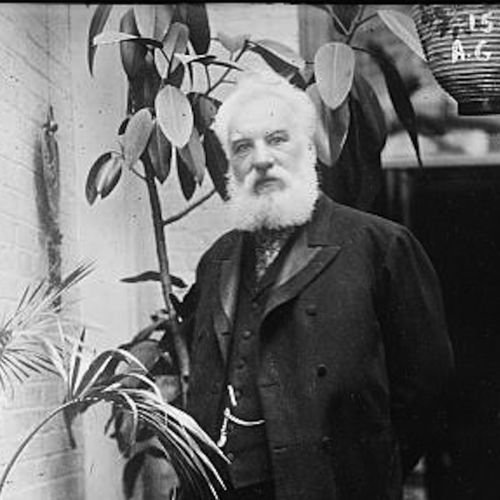
March 3rd 1847 saw the birth of Alexander Graham Bell in Edinburgh.
Bell’s education was largely received through numerous experiments in sound and the furthering of his father’s work on Visible Speech for the deaf. Bell worked with Thomas Watson on the design and patent of the first practical telephone. In all, Bell held 18 patents in his name alone and 12 that he shared with collaborators.
The second son of Alexander Melville Bell and Eliza Grace Symonds Bell, he was named for his paternal grandfather, Alexander Bell. For most of his life, the younger Alexander was known as “Aleck” to family and friends. He had two brothers, Melville James Bell and Edward Charles Bell, both of whom died from tuberculosis.
During his youth, Alexander Graham Bell experienced significant influences that would carry into his adult life. His Grandfather was a well-known professor and teacher of elocution. Alexander’s mother also had a profound influence on him, being a proficient pianist despite her deafness. This taught Alexander to look past people’s disadvantages and find solutions to help them.
Alexander Graham Bell was homeschooled by his mother, who instilled in him an infinite curiosity about the world around him. He received one year of formal education in a private school and two years at Edinburgh’s Royal High School. Though a mediocre student, he displayed an uncommon ability to solve problems. At age 12, while playing with a friend in a grain mill, he noted the slow process of husking the wheat grain. He went home and built a device with rotating paddles with sets of nail brushes that dehusked the wheat. It was his first invention.
A lot has been written about Bell’s invention but before the family emigrated he was only 16, when he accepted a position at Weston House Academy in Elgin teaching elocution and music to students, many older than he. At the end of the term, Alexander returned home and joined his father, promoting his father, Melville Bell’s technique of Visible Speech, which taught the deaf to align specific phonetic symbols with a particular position of the speech organs (lips, tongue, and palate).
After the death of his two brothers, and Aleck’s health deteriorating his father decided, for the sake of his health they had to move to a better climate in the Americas, his son resisted the move at first but he relented, and in July 1870, the family settled in Brantford, Ontario, Canada. There, Alexander’s health improved, and he set up a workshop to continue his study of the human voice. He later took up a position as a tutor at Boston School for Deaf Mutes and settled in the city in 1871.
Two years later, he was appointed Professor of Vocal Physiology and Elocution at Boston University.
These early experiments in speech creation, along with his knowledge of anatomy, informed his own experiments on transmitting speech, which he began in earnest from 1873.
Bell did not think he was inventing a ‘telephone’ during his early experiments. He was working on the holy grail of the day: sending multiple telegraph messages over the same wire. He aimed to make electro-mechanical devices capable of transmitting and receiving different tones for each message.
He was supported financially in this work by the father of one of his students, Gardiner Hubbard, a wealthy lawyer and politician, whose deaf daughter, Mabel, had been taught to lip-read and speak by Bell. Bell fell in love with Mabel. Her father, being aware of Bell’s experiments with possible ‘speaking telegraph’ devices, refused his permission for the couple to marry until Bell had successfully developed his new invention. To speed matters along, he also funded an assistant, Thomas Watson.
Sensing the danger of rival developments for this valuable invention, Bell’s future father-in-law filed an application for ‘Improvements in Telegraphy’ on 14 February 1876. On that very same day a few hours later – or was it actually a few hours earlier? – inventor Elisha Gray filed his own idea for a telephone at the same office. Bell was granted the patent on 7 March 1876. On 9 July 1877, Bell, Hubbard, Watson (and other funders) established the Bell Telephone Company to market the new device. Bell and Mabel married two days later.
Controversy remains as to whether Bell or his father-in-law might have had access to the details of Gray’s patent through an office clerk in Hubbard’s pay. The clerk seemed to admit as much in a later court case, but Bell’s patent was upheld, as it was in the many cases which followed.
On 11 August 1877, Bell and Mabel arrived in Britain from the USA on honeymoon. In Bell’s luggage was his new communication device, the telephone. Bell travelled the country promoting his invention, even demonstrating the device to Queen Victoria, who was so amused she asked to keep the temporary installation in place. The first telephones went on sale later that year.
Sometimes described as the most valuable patent ever filed, for years following the award, Bell had to defend his patent in expensive and protracted litigation battles brought by a whole range of inventors. In 2002, the US Congress formally recognised Italian Antonio Meucci as the true inventor of the telephone, based on prototypes he demonstrated in 1860. Bell and the Italian had shared a workshop in the 1870s. Meucci was pursuing his claim in the Supreme Court when he died in 1889. France and Germany cite their own contenders for the title.
In many respects, Bell’s telephone was flawed, his receiver and transmitter designs being considerably improved by others within a couple of years. Among those were Thomas Edison and Professor David Hughes, who both produced improvements to Bell’s early instrument, transforming the telephone into a truly successful communication device.
Still widely known as ‘the inventor of the telephone’, Bell had given up his interest in this invention by his early thirties. He spent the rest of his life with Mabel and their family in Canada, working on a series of varied projects including flight, sheep breeding, developing a ‘vacuum jacket’ to aid artificial breathing and the founding of the National Geographic magazine. His foremost passion remained enabling deaf people to lip read and speak, therefore blending into a hearing world. This was in itself controversial to sections of the deaf community, disenfranchising those who preferred to communicate using sign language, which they viewed as the primary language of the deaf.
Bell’s last visit to Edinburgh was in November 1920. At a speech given to pupils at the city’s Royal High School, where he had been a student 60 years before, he imagined that this young generation might live to see a time when someone “in any part of the world would be able to telephone to any other part of the world without any wires at all.”
He died on 2nd August 1922 aged 75. On the day of his funeral the telephone systems in the US and Canada were silenced for one minute, can you imagine that happening nowadays!
22 notes
·
View notes
Text
Your one. Wild and precious.
The most salient thing about finding the lump was my lack of worry. I had my regular gynecologist appointment coming up and figured I’d mention it then. This is notable because I’m a known hypochondriac. (Side note: doesn’t it feel like it should be “hypERchondriac”?) Anyway, to give an example, I’d pulled a muscle in my back a few months before and became convinced that the pain was actually from a tumor on my spine that had finally grown big enough to make itself known. I spent an evening googling symptoms of bone cancer. That’s the kind of cancer that animates my nightmares. For some reason, breast cancer never really caught my imagination. It seemed too feminine, too pink, too popular. I had the irrational but strong belief (how often those two go together) that my breasts weren’t big enough to cause any problems.
When Dr. Ruby confirmed the presence of the lump, she said, “You’ve earned yourself a mammogram and an ultrasound,” and I swear I felt a flash of pride like I’d gotten 100% on a test. After so many health fears had come to naught, I had finally correctly diagnosed myself with something. A lump. She said it was almost certainly a cyst but I needed to get it checked out. “I can’t pretend I didn’t feel it,” she said, then amended, “Well I could, but I shouldn’t.” She tells me – and I confirmed this – that 90% of newly discovered breast lumps turn out to be benign. This fact didn't stop me from descending into existential despair over the next week.
Two days later, I was in Brooklyn visiting M for a long-planned weekend in the city. He’s either a good or a bad person to be around for something like this. He’s had his own health fears, so he’s genuinely empathetic, but because he’s pessimistic about the body’s ability not to totally fuck everything up, there’s the feeling when you’re talking to him about your lump that although he’s telling you it’ll be fine, what he’s thinking is how sad it is that you’re gonna die.
Over that weekend, I cycled repeatedly through the stages of grief, but spent most of the time jumping from denial to acceptance of my imminent death and back again. I got so far ahead of myself that there were times when I was actually already dead. It’s not just that the lump would be found to be cancerous. It’s that it would be found to be terminal and the only question would be how long I had. I felt that I could work with two years. This seemed like long enough that death could still feel unreal. Long enough that other people I knew could conceivably die before me, a possibility that I found comforting. If not two years, then I didn’t want more than a week. Long enough to surround myself with loved ones but not so long that I could be expected to get a good start on a memoir.
I walked around Brooklyn feeling the sun on my face. Oh beautiful sun. How I’ve loved thee from afar. I wondered how old John Keats was when he died of tuberculosis. “I already got more time than a lot of people,” I told M. I think of a friend of a friend, a promising young woman, who had died in a horrific car crash right after college. Now that’s unfair. I’m 37. At one time that would have been considered a ripe old age.
We go see The Zone of Interest and afterwards go home and watch Deep Impact. This double feature of death was a mistake. By the end of the night I feel bereft, although I did have a Deep Impact based realization. I’d never really understood making a huge deal about the world ending, because we already know the world ends. It happens when we die. But as I watched our asteroid-spotting hero running up a mountain to escape the tidal wave that had already killed Tea Leoni and her feckless father, I realized that it actually would be way sadder to die knowing everyone else was dying too. This realization made me feel spiritually generous and a little less morose about my quickly approaching end. At least the world would go on without me.
By the time I went to my mammogram appointment a week later, I’d roped so many people into this little psychodrama that I was starting to get the appeal of cancer. People really seemed to care! Everyone should die twice. That way you could really enjoy it the first time.
After the mammogram I get an ultrasound and then lie on the gurney in the darkened room waiting for the doctor to come and confirm my fate. The doctor does come. He’s young. Beautiful boy. So much life left to live. He tells me matter of factly that from what they can see on the mammogram, it’s not likely to be cancer. I still need to get a biopsy, but he declares the whole situation low risk and walks out as I sniffle into a tissue.
I read that people who identify as hypochondriacs die an average of five years earlier than those who don’t. This is the hard truth about hypochondria, one day you’ll be right. But that day is not today.
The euphoria doesn’t hit for a few hours, but when it does. It does. This is the secret upside to letting yourself completely unravel. The hypochondriac’s little prize, which is actually not so little. When your fear comes to nothing you have the elation of someone who has narrowly escaped death. You’re not just back to where you were. You’re better than ever. Music tastes like ice cream. Ice cream feels like cocaine. Were you actually close to death? No. But that doesn’t matter to your brain, which can’t tell the difference between a lion and a door slamming kind of loud in your vicinity.
You realize this is what you could do with your one wild and precious life. Instead of living, perform death. Be carried from one little hysteria to the next. The perfect narrative arc over and over until it’s over. Luckily by that time you’ll be so good at it. It’ll be perfect. You’ll have finally gotten it right.
(Ed note: Biopsy confirmed lump to be benign. Phew.)
5 notes
·
View notes
Text
Updates
I don’t know how many of you will read this, but I’m ranting about positivity for once! Some people have been disappointed about my disappearing or have been annoyed about my lack of content, so I included some of an explanation.
I know as cringe as it sounds, I can be a rather dark/negative person. I know I am, I’ve been told - sometimes harshly - on here.
My life has been hellish in a lot of ways that I won’t share. HOWEVER, right now, I feel so heard. This is the lightest I’ve felt in months. Those of you who know me well know I have had my mental health tank since October, and it worsened as time went on.
A lot of this was due to loneliness, but more so, struggles with my tuberculosis thesis. My advisor essentially abandoned me. They didn’t respond to my emails for months and when they did, essentially told me to start over. I started writing in October and they didn’t respond to me until January. I had the university on my ass threatening to suspend me because I had an incomplete that HAD to be turned in that semester. I then didn't hear from her until March and nothing else. except more talks of starting over. I used to guess work to appease the university and was lucky it to finish the last day after sending multiple emails for what the professor wanted. . Guys, if you are in a graduate program - It is NOT NORMAL for an advisor to disappear on you, especially for this long. Talk to someone higher up if this happens to you.
On the years of original research which included travel, experimentation, and having to develop extremely complex numerical data.
I finally talked to my historic preservation advisor and we’re shortening it and he’s making sure I can use at least some of the 60 pages I have already written. I have written 250 pages of tuberculosis research since I started the research process in 2018, but only 60 for the thesis which has to be a minimum of 80.
I would be able to graduate on time and FINALLY get a proper job when this is over.
It’s the lightest I felt in years. I have some time off to work on other things.
This doesn’t mean all my problems are fixed. I still have a lot of personal things going on in life like health that will stay personal as possible, and the loneliness is still horrible, but I hope that will slowly improve.
I’ll also be able to finally set up a Ko-fi so I can finally make some money. I lost a lot of funds because I was expected to come at the beck and call of my thesis advisor at any time for additional work. They did not fund me for anything.
So yeah, I finally have my wonderful historic preservation professor and my history of medicine professor on my side.
Yes, this is long, but I don’t know how to cut things down since I ramble. I literally wrote a script so I wouldn’t stutter and ramble nervously. lol (It’s very helpful if you all want to try it!)
But yeah, here’s hoping I can be more present in friendships and find some new friends, and maybe make a little money on the way.
Thank you for those who have shown your support. Your anons have been so wonderful. You’re so appreciated. <3
16 notes
·
View notes
Text

Polish Activist Saved Jewish Children
Dying of tuberculosis
Julian Grobelny was a Polish human rights activist who saved hundreds of Jews from the Holocaust, most of them children he and his wife Halina rescued from the Warsaw ghetto.
Born in Brzeziny, Poland in 1893, Julian was one of many children in a poor farm family. At that time Brzeziny had a thriving Jewish community, and although Julian wasn’t Jewish, many of his neighbors and playmates were.
As a young man, Julian trained as an electrician. He fought in World War I on behalf of the Austro-Hungarian empire and after the war ended in 1918, he took part in the disarmament of the Germans. During the interwar period, Julian was an outspoken and prominent activist on behalf of Polish independence. He worked for the municipality of the city of Lodz, and organized factory workers in the city to obtain better working conditions and wages.
During the 1920’s Julian became increasingly ill from tuberculosis. He had to stop working full-time in 1930 due to his illness, but continued his activism on behalf of workers. In 1939, the Nazis invaded Brzesiny, and as a social activist Julian and his wife Halina were labeled “enemies of the Third Reich.” The couple immediately went into hiding, and then relocated to Warsaw where they kept a very low profile.
Meanwhile, the Nazis were busy forcing the city’s large Jewish population – over 375,000 – into a squalid ghetto where men, woman and children desperately fought to survive each day despite a severe lack of food, not to mention space, electricity, plumbing, medicine and other life essentials. Julian – a freedom activist who grew up around Jews – was horrified at what was happening. Sick and with a target on his own back, Julian could not have been blamed for staying home and letting others do the heavy listing. But embodying the Jewish adage “when there is no man, be the man,” Julian saw a problem and determined to do everything he could to solve it.
Julian’s wife Halina was in full agreement with his desire to help Jews, and together they brazenly walked into the Warsaw ghetto and offered to help the Jews who were suffering so badly there. The Grobelnys were especially affected by the plight of the ghetto’s starving Jewish children. Without kids of their own, they became obsessed with rescuing Jewish children. Parents in the ghetto, knowing they were doomed, entrusted their precious children to the kind Polish couple, who brazenly took them in hand and led them out of the ghetto as if they were their own. The Grobelnys also welcomed over a dozen Jewish escapees from the ghetto into their own humble humble, and created fake papers identifying them as “Aryan.”
In 1944, Julian was arrested by the Gestapo for his human rights advocacy before the war and imprisoned. Fortunately the Germans never found out about his work on behalf of Polish Jews, and Julian had several physician friends who pulled strings to get Julian released. Among Polish human rights advocates, Julian became a hero, and before the war ended he was elected Mayor of the town of Minsk in eastern Poland.
Sadly, Julian’s health continued to worsen, and he died of tuberculosis in December 1944, only a month before Poland was fully liberated. In 1987, forty-three years after Julian’s death, he and Halina (who outlived him by almost fifty years) were honored as Righteous Among the Nations by Israeli Holocaust Memorial Yad Vashem. Halina died six years later, in 1993.
For saving hundreds of Jewish children, despite his own worsening illness, we honor Julian Grobelny, as well as his wife Halina, as this week’s Thursday Heroes.
19 notes
·
View notes
Text
Hi. I've started writing a semi-weekly TB Newsletter, if you're interested in that kind of thing. Here's the second letter--about public-private partnerships, leprosy, and my forthcoming big announcement about expanding access to tuberculosis care. You'll hear more about that on Thursday. Anyway, here's the newsletter. You can sign up here.
---
In advance of the Big Announcement this Thursday, I made a vlogbrothers video today on how we end TB–with the comprehensive care plan often known as S-T-P, which is short for “Search, Treat, and Prevent.” But one thing I didn’t discuss in that video is the downstream benefits of comprehensive TB care.
Once you’ve hired community health workers to screen for TB, it becomes much easier to screen for other illnesses like diabetes, high blood pressure, and non-TB lung issues (especially lung cancer). TB is notoriously a disease of vicious cycles–a disease of malnutrition that makes malnutrition worse, a disease of poverty that makes poverty worse, and so on–but addressing TB can be a story of virtuous cycles: TB survivors become TB advocates, as I’ve seen with my friend Henry in Sierra Leone. More effective TB treatment leads to less stigmatization of the disease, as communities come to see the disease as curable and survivable rather than terrifying and deadly. And better access to TB care leads to a stronger overall healthcare system, because more community health workers are better connected to more primary healthcare clinics, which allows communities to better address all kinds of health problems.
—
Mycobacterium tuberculosis is not the only bacteria of its family that causes a lot of human suffering; there is a closely related species called mycobacterium leprae that causes the disease known as Hansen's Disease, or more commonly leprosy. There are still around 200,000 cases of leprosy diagnosed each year around the world, and while the disease is curable, it also remains–especially if not caught and treated early–a significant driver of suffering and disability in our world.
There are many connections between TB and leprosy: Not only are the bacteria that cause these illnesses very similar, but patients have often expressed similarities in experience. TB patients who were encouraged or forced to live in sanitariums often compared themselves to lepers. One disheartening parallel between the diseases is that in both cases, those living with these illnesses are often abandoned by their families and must make new social connections within the new community of “leper” or “consumptive.” Also, both Hansen’s Disease and TB continue to exist largely because of systemic failures rather than due to a lack of knowledge or technology.
—
I really recommend Dr. Salmaan Keshavjee’s TED talk about how we ended TB in the U.S., and how we can end it using the same strategy around the world.
—
Last link from me today: I’ve been thinking a lot about the complex intersection between public and private investment (for reasons that will be clear on Thursday!) and I keep coming back to one infographic in an excellent paper (https://journals.plos.org/plosone/article?id=10.1371/journal.pone.0256883) about the public money that was poured into the creation of the GeneXpert Machine, which can quickly and accurately test for TB. The GeneXpert machine has created a lot of profit for Danaher’s shareholders, and it has also created some societal benefit, but it could create a lot more societal benefit if it created less profit for Danaher’s shareholders. This tension seems to me one of the defining features of 21st century life. Anyway, here is the infographic:
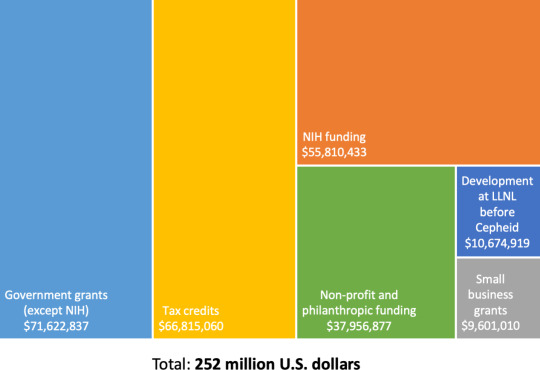
That’s the money–over $250,000,000 of it–that came from taxpayers (mostly in the U.S. and Europe) to fund the creation of the GeneXpert Machine. And yet, this tech largely funded by the public is controlled entirely by private enterprise. I’m troubled by that model of value allocation, even if I still believe that private money and private enterprise have important roles to play in fueling innovation. But taking a quarter billion dollars of public money and then claiming total ownership over a technology, and using that ownership to deny the technology to the world’s poorest people, seems like a deeply flawed system of resource distribution to me.
I’ll see you on Thursday. I’m nervous and excited.
DFTBA,
John
#tuberculosis#it's so funny how this became my job#not like my paying job but the one i do and think about all the time#like of all things#it was this#this is my hobby#anyway#beats jkr's horrible fucking hobby anyday
846 notes
·
View notes
Text
Patient History Form Template
BASICS
Full Name: (First, Middle, Last)
Preferred Name:
Birthdate: Time of Day, Day / Month/ Year
Age:
Gender:
Sex:
Marital Status:
Ethnic Group:
Language Preference:
Cultural Needs and Preference:
Religion:
CONTACT INFORMATION:
Address: Street and Number, City, State, Zip Code
Phone Number:
Email:
Emergency Contact 1: Name, Relationship, Phone #
Emergency Contact 2: Name, Relationship, Phone #
BACKGROUND INFORMATION: (Erase anything not important to character)
Are you working? If yes, occupation:
If yes, hours per Week:
If not, are you retired?
If not, are you disabled?
If not, are you on sick leave?
Do you receive disability or SSI?
If yes, for what disability and for how long?
Highest Education: (High School, Some College, College Graduate, Advanced Degree)
Have you ever had legal problems? (If yes, what?)
Hobbies:
Hobby Hazards:
Military Service:
Caffeine Consumption:
Average Hours of Sleep:
Stress Concerns:
Diet:
Physical Activity: (None, Low, Moderate, High)
Allergies:
SUBSTANCE USE INFORMATION: (Erase anything that has nothing to do with your character. Fill in the form like this)
Cannabis: Age of First Use/ How often or much / How many years of use/ Do you still use?
Alcohol:
Crack/Cocaine:
Methamphetamine/Ritalin/ Benzedrine/ Dexedrine:
Benzodiazepines/ Tranquilizers:
Sedatives/Hypnotics/ Barbiturates:
Heroin:
Street or Illicit Methadone:
Other Opioids:
Hallucinogens:
Inhalants:
Other (Specify):
PREVIOUS AND PRESENT PHYSICIANS:
Primary Care Physician-
Mental Health Professional(s)-
CURRENT MEDICATIONS
Drug Allergies:
Medication #1 (Name): Dose (include strength & number of pills per day)/ How long have you been taking this?
(Repeat as necessary. Please include non-prescription medications and nutritional supplements)
PEDIATRIC MEDICAL HISTORY
Any Problems During Mother’s Pregnancy:
Any Problems During Birth:
Any Childhood Illnesses: (Measles, Mumps, Rubella, Chicken Pox, Rheumatic Fever)
Immunizations: (Diphtheria, Haemophilus influenzae type b, Hepatitis A, Hepatitis B, HPV, Influenza, Measles, Meningococcal Mumps, Pertussis, Pneumococcal, Polio, Rotavirus, Tetanus, Zoster) (Note for Writers: Zoster is the only shot your character may not have if they have a normal pro-vaccination family. Zoster is only for 50+. Tetanus shots are updated every ten years. You get TDap boosters every ten years. Influenza is every year. The rest are given early in childhood and last the rest of their lives)
Where were you born and raised?
Were there any major illnesses in childhood? No
Were there any major injuries in childhood? No
GENERAL MEDICAL HISTORY
Please list all medical conditions you’ve had
Diabetes
Heart murmur
Crohn’s disease
High blood pressure
Pneumonia
Colitis
High cholesterol
Pulmonary embolism
Anemia
Hypothyroidism
Asthma
Jaundice
Goiter
Emphysema
Hepatitis
Cancer (type) _________________
Stroke
Stomach or peptic ulcer
Leukemia
Epilepsy (seizures)
Rheumatic fever
Psoriasis
Cataracts
Tuberculosis
Angina
Kidney disease
HIV/AIDS
Heart problems
Kidney stones
Other Medical Conditions: (specify)___________________
(Delete all that do not pertain to character)
FAMILY HISTORY
Has any person, related by blood, had any of the following? If so, who?
High Blood Pressure:
Stroke:
Heart Attack Before 55:
Blood or Clotting Disorder:
Cholesterol or Blood Fat Disorder:
Diabetes:
Glaucoma:
Epilepsy:
Cancer: (Type)
Alcohol/Drug Problems:
Psychiatric Illness:
Suicide:
WOMENS REPRODUCTIVE HISTORY:
Age of first period:
Pregnancies: (Number, start and end of each)
Miscarriages: (Number, dates)
Abortions: (Number, dates)
Have you reached menopause? (If yes, at what age?)
Do you have regular periods?
SYSTEMS REVIEW
In the past month, have you had any of the following problems?
General
Recent weight gain; how much?
Recent weight loss; how much?
Fatigue
Fever
Night sweats
Muscle/Joints/Bones
Numbness
Joint pain
Muscle weakness
Joint swelling: where?
Ears
Ringing in ears
Loss of hearing
Eyes
Pain
Redness
Loss of vision
Double or blurred vision
Dryness
Throat
Frequent sore throats
Hoarseness
Difficulty in swallowing
Pain in jaw
Heart and Lungs
Chest Pain
Palpitations
Shortness of breath
Fainting
Swollen legs or feet
Cough
Nervous System
Headaches
Dizziness
Fainting or loss of consciousness
Numbness or tingling
Memory loss
Stomach and Intestines
Nausea
Heartburn
Stomach Pain
Vomiting
Yellow jaundice
Increasing constipation
Persistent diarrhea
Blood in stools
Black stools
Skin
Redness
Rash
Nodules/bumps
Hair loss
Color changes of hands or feet
Blood
Anemia
Clots
Kidney/Urine/Bladder
Frequent or painful urination
Blood in urine
Women Only
Abnormal Pap smear
Irregular periods
Bleeding between periods
PMS
Psychiatric
Depression
Excessive worries
Difficulty falling asleep
Difficulty staying asleep
Difficulties with sexual arousal
Poor appetite
Food carvings
Frequent crying
Sensitivity
Thoughts of suicide / attempts
Stress
Irritability
Poor concentration
Racing thoughts
Hallucinations
Rapid speech
Guilty thoughts
Paranoia
Mood swings
Anxiety
Risky behavior
Other Problems
(Specify)
ADVANCED CARE DIRECTIVES
Do you have any of the following?
Advance Directives:
Living Wills:
Pre-Hospital DNRs:
POLST (Physician Orders for Life-Sustaining Treatment):
4 notes
·
View notes
Text
What is meant by zero covid? NEWCOMERS READ THIS: ZeroCovidCommunity
Below is copied from the post; links and formatting may be broken so I recommend reading the original.
If you already know, you fucking know and don't need to read all this for the hundredth time. If you don't, it's good info.
Covid is not over, because long covid has no cure.
The virus may not kill the victim but instead make them disabled with crushing fatigue, debilitating brain fog or over 200 other recorded problems. People with long covid often lose the ability to work or even get out of bed. About half of long covid is ME/CFS [ref1 ref2 ref3 ref4], which is the extremely disabling disease causing fatigue and brain fog.
Somewhere between 5% and 20% of covid infections become long covid. For reference a "medically rare event" is considered 0.1%. Long covid isn't rare. Serious disability from long covid isn't rare. Vaccines and antivirals reduce the chances a little bit but are not a solution on their own. Long covid lasts for years. Some people improve but most never completely recover. Scientific research into it is only just starting and will be many years before it produces results.
The only thing left then to not get covid in the first place. Or if you've already had it to not get it again, as we know the damage to the body accumulates with repeat infections. Not getting it again also gives you the best chance of recovery if you already have long covid.
Death from covid is also still a problem. It is a leading cause of death. You may have heard only old people die of covid, but old people die more of anything. If you compare covid deaths in children with other things that kill children, then covid comes out as a leading killer of children. This is true in every age group.
Everyone must be protected. Even if we ourselves aren't harmed by covid on the first or second infection, we'll be greatly affected if so many of our friends, family and neighbours get sick. Millions are missing from the workforce due to covid.
The five pillars of prevention are: clean air, masks, testing, physical distancing and vaccination. We must also redouble efforts into research, for example better ways of cleaning the air, better vaccines, better tests.
We choose health over disease. Ultimately we aim to suppress covid transmission and eventually reach elimination so that covid becomes rare in society. Zero X is not some radical new idea, it's how we've always dealt with serious disease. We don't think it's acceptable to "live with" other dangerous infectious diseases like HIV/AIDS, tuberculosis, smallpox or polio, why should we "live with" Covid?
(Fun fact: AIDS is nothing but long HIV. An acute HIV infection seems like nothing special, it's mild flu-like symptoms for a week or two which gets better... until 5-10 years later when the victim dies of AIDS. Reminding us that just because it starts with flu-like symptoms doesn't mean that's how it ends.)
See also:
Don't Breath It In (1:06min) video about how covid spreads and how to protect yourself and others
Long Covid Symposium final talk (6:36min)
https://longcovidlearning.org/ - resource explaining long covid for people unfamiliar with it
The World Health Network website. With useful resources on things like masks, how to make schools safer.
r/covidlonghaulers and r/longcovid Have a read of some personal stories of long covid.
The billionaires at Davos don't think covid is over. The media they own tells us plebs that covid is a cold and let us get sick, while they themselves require PCR tests, HEPA filters in every room and make their drivers wear masks
You May Be Early, but You're Not Wrong: A Covid Reading List
2 notes
·
View notes
Text
Is psychoanalysis as a clinical practice and as a theoretical discourse capable of addressing burning issues of today's society such as race, power, and privilege? Is psychoanalysis only for the well-to-do? Is psychoanalysis normative, sexist, and patriarchal?
Is psychoanalysis as a clinical practice and as a theoretical discourse capable of addressing burning issues of today's society such as race, power, and privilege? Is psychoanalysis only for the well-to-do? Is psychoanalysis normative, sexist, and patriarchal? As early as 1918, two months before the Armistice, aware of the destruction brought about by World War I and the huge problems created for the underprivileged, Sigmund Freud gave a moving lecture at the Fifth International Psychoanalytic Congress in Budapest. The often-quoted short address, ‘Lines of Advance in Psycho-analytic Therapy,’ initially focused on technical issues of treatment method. However, it dramatically changed its tone toward the end when Freud speculated about the future of psychoanalysis. Then he announced that ‘at some time or other the conscience of society will awake’ (Freud, 1919[1918], p. 167). The new awareness would entail:
that the poor man should have just as much right to assistance for his mind as he now has to the life-saving help offered by surgery; and that the neuroses threaten public health no less than tuberculosis and can be left as little as the latter to the impotent care of individual members of the community. When this happens, institutions or out-patient clinics will be started, to which analytically trained physicians will be appointed, so that men who would otherwise give way to drink, women who have nearly succumbed under their burden of privations, children for whom there is no choice but between running wild or neurosis, may be made capable, by analysis, of resistance and of efficient work. (1919[1918], p. 167)
By appealing to the conscience of society, Freud made an apparently obvious remark, although this was quite revolutionary at the time: the poor have as much right as the rich to benefit from psychoanalysis. In his passionate plea, Freud thus proposed a ‘psychotherapy for the people’ whose structure and composition would follow the model of ‘strict and untendentious psycho-analysis’ (p. 168). This progressive vision for psychoanalysis was at the same time a call for social reform. Both highlight the role of psychoanalysts as agents of transformation at an individual as well as a social level. This would be materialized in the interwar decades by the creation of an inclusive network of more than a dozen clinics in seven countries aimed at making psychoanalysis available to all.
PATRICIA GHEROVICI - Hate Up to My Couch: Psychoanalysis, Community, Poverty and the Role of Hatred. Psychoanalysis and History 24.3 (2022): 269-290. Edinburgh University Press
5 notes
·
View notes
Note
Could you possibly write more rut HCs for all the papas???
Papa Nihil's HCs for his rut
just
Woomph 😳💞✨
Of course, I can! But say please next time, okay?
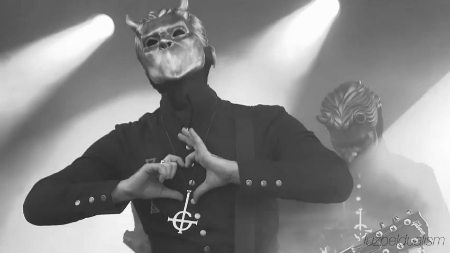
I got some general headcanons for ya!
The papal rut is actually a curse. The Olde One brought it upon the Papas of the church way back in the dark ages for their hubris on thinking they can bring the Anti-Christ with their bodies.
The text got lost in translation so the church sees this as a blessing.
A papa only gets this rut once they are crowned Papa. So none of the Papas, including Copia, never went through it until they gained their title.
On to the rest of the Papas!

Secondo truly believes that he can sire the Anti-Christ, so he purposefully goes out of his way to be on tour during his rut.
The party animal title is because his rut is in full effect.
However, due to his withering age, he's shooting banks. Secondo is in full denial about it.
He fully leans into his rut, regardless of what's going on around him. He'll perform a sermon with a raging boner. No one's got the balls to say anything. Except for Terzo... cause he's an ass.
Secondo has shades of Primo, he too caterwauls. However, he doesn't sound like a demonic cat. No, Secondo sounds like this
This only happens when he's near someone he's attracted to, or someone does something cute. Secondo saw Copia talk to a rat once and Papa couldn't stop BLEGH at Copia for two days.

Terzo never really had problems with his rut, because he has thyroid issues.
This by no means he doesn't get a rut, it's not as powerful as the rest of his brothers. Lucifer is very powerful, but He cannot stand against Mother Nature.
Terzo gets very needy like his father, needs constant cuddles and kisses. Terzo is very much like Nihil by being very cat-like in nature. Think of Nihil as a raised in captivity tiger, and Terzo as a domestic house cat.
Terzo is the only one of his brothers who's inherited Nihil's purring. He'll purr if you give him attention, he'll purr in a nice warm bath, he'll purr during sermons even when he's giving them.
At a rare family dinner, Terzo purred so loud that he caused Primo, Copia, and his father to fall asleep.
Terzo has a bad rep of marking. And not the sexy kind. This was hinted at in his childhood, but luckily it switched from his bladder to his cheeks.
Like his father, Terzo will involuntarily move on his own to establish dominance. Instead on draping himself on someone, Terzo rubs his cheeks on a person like a cat rubbing its scent glands.
He's done this to practically everyone in his life. His family, his ghouls, Copia, no one is safe.
This has led to black marks on people from his paint. Secondo doesn't mind because Terzo goes after his brother's head and gets paint where the older Papa cannot reach.
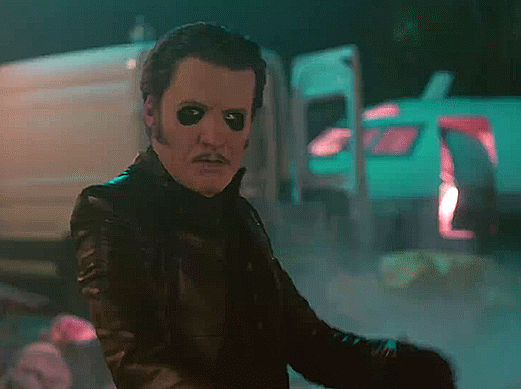
Copia had a very hard time with the beginning of his ruts. There was no one in the ministry to coach him because the other Papas were dead. Sister Imperator only knew so much about them with her limited time with Papa Nihil.
The double whammy is that Copia's ruts are much more powerful due to a new bloodline. The reason Secondo and Terzo's ruts weren't bad is because the curse made it so. Kinda like how over breeding dogs and cats causes health problems.
Copia needs micro-dosing to keep his rut contained at the bare minimum. To everyone else, it looks like he takes insulin shots.
The first time was the absolute worst. After he was anointed Papa, Copia didn't know he would get a rut seeing as how he wasn't part of the bloodline. Then it hit him. A cold wave washed over him causing unstoppable shivering. Hot flashes made his blood feel like lava. Every sound was amplified to deafening heights. He heard everything in the ministry, including siblings and ghouls fucking.
When Copia woke up the next day, he was in the woods nearly naked. He heard the calls of his ghouls looking for him. Come to find out, Copia killed three siblings of sin and mutilated one in his rut haze. Apparently, he was making his way to the village on the other side of the dense forest surrounding the church.
Copia still hasn't forgiven himself. The sister who he maimed is no longer part of the church.
Whenever he's getting close, Copia only surrounds himself with his ghouls seeing as they are the only ones who can handle his haze.
He's even begged Sister Imperator to put him in medically-dosed coma before. Sister consoled him to sleep before crying silently to herself.
The only way this can calm down is with a Prime Mover, or his death.
19 notes
·
View notes
Text

I'm still trying to get back into normal drawing, durtying the paper... But tonight I really wanted to sketch Piko, as he's my light for 13 years already...
________________________________
Down here I want to write some thought and things, why rn I'm so thankful to Piko and how his music still helps me 🤧
It's like I wanna start with the fact, that it's around a year since I got tuberculosis.. (according to doctors)
Since October I started my treatment and it's difficult, I had another surgery and I hope to get back to normal life by June, but there are no any forecasts for now(
It's a difficult thing to live with, but because of stereotypes, discrimination and you're alone against the world 🫠 for real, I can say that the pressure is hard and you have to keep struggling and fighting just to be part of society..
And here is the thing that only one thing can make me happy and calm - listening to music, Piko's music! I remember the day Piko and Sekihan performed together, I was preparing for new analyses at the hospital and I started to cry, cry hard, feeling if I'm the happiest person in the world! For the first time in few months I felt the will to fight, I was feeling myself alive... I really don't know, how to describe my emotions, but at very least I was thankful to them! Seeing how they work rn makes me work hard too!
The second thing happened in 2021, it was already hard time for my health, but looking at Piko and his health problems I made myself look forward and be strong! And I got a thing to be strong! Once in my life I got reply from Piko to my question... Idk, I was about to cry, when I saw it... I got advice I use even rn in 2023, leaving one hospital for another. He told me, that you should think about what you'd do, when everythings is over, when you're healthy again... Every day, when I start to feel down again, coz I have pain, problems with ppl, coz some of them does think that I'm not a human anymore, ignor me... I remember these word, I look at that message and start to calm down, get my will to live again... I think there no words to describe, how thankful I am, how just a simple sentence bring me to life again and again...
That was a lot oh my god ahahaha
But, all I want to say, if someone reached this point - stay healthy, take care of your health - it's one and only thing which is important in this life! Remember it!
5 notes
·
View notes